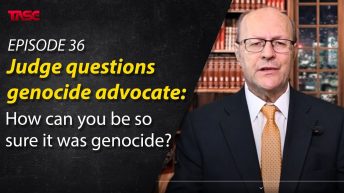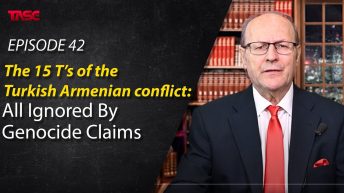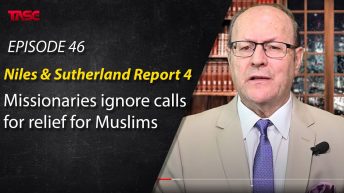90 views Nov 21, 2022If the events of 1915 during the Ottoman Empire did not constitute an Armenian Genocide, then what was it? The short answer is that it was a wartime military measure taken to mitigate a wartime military threat to the Ottoman war effort. The threat was very serious, posed by a widespread network of Ottoman Armenians, who were either directly involved in violent revolts, terrorism, and treason, or acted as logistic support base for such Armenian insurgents. Since it was impossible to separate the guilty from the innocent at a chaotic time of raging world war, brutal Russian invasion, and many vicious Armenian revolts, the Armenians of entire villages and towns in the war theater of Eastern Anatolia had to be evacuated. Even then, most of the Armenians in western parts of the Ottoman Empire were exempt from this temporary relocation, or TERESET, order of May 27, 1915, because they posed no threat to the Ottoman war effort and some were, indeed, supportive of it. There were many exemptions from the TERESET order. Armenians in the employ of the Ottoman government, essential crafts people, Catholics, and Protestants were all excluded from the TERESET order. The relocation was temporary. Those Armenians who had not been involved in any acts of violence and sedition could return to their homes after the war—and more than a few did. This alone shows that TERESET was no genocide. I covered this issue in detail in episodes 19, 24, and 25. Such relocations are not uncommon in history. The U.S. resorted to the forced relocation measure, a whopping 27 years later, during World War II, by moving the Japanese Americans to concentration camps for no good reason. Japanese Americans had committed no acts of hostility or sedition in the U.S. They were still moved just because of a fear that they might join the Japanese enemy if the Japanese army invaded America. Fear, not evidence, imagine that! I covered all that in episode 37. On the one hand, the U.S. lectures Turkiye for resorting to forced relocation of its violent and treasonous citizens in 1915, but on the other, the same U.S. forces its own, totally innocent citizens of Japanese heritage into concentration camps almost three decades later. What gives? Still on the one hand, the U.S. blames the Ottoman Empire with committing the crime of genocide for taking a totally justifiable wartime, homeland-security-measure, while expecting to remain beyond reproach for an obviously unjustified, unethical, and brutal act of ethno-religious discrimination. I covered this in episode 38. That said, both Armenians and Muslims in Eastern Anatolia experienced agonizing casualties and damages during World War I. While numbers are debatable, hundreds of thousands perished on both sides. Most were innocent. Most were caught up in a turmoil of wartime violence. All deserve our sympathy and respect. Their known and unknown graves testify to the suffering endured by all, not just the Armenians. No race, religious, or ethnic group stands above or below another in the eyes of humanity. These sentiments must be remembered before starting a conversation on the longstanding dispute over allegations of Armenian genocide. Genocide is a word loaded with passion and moral corruption. It typically evokes images of Jews dying in Nazi cyanide chambers in Auschwitz, Bergen-Belsen, Dachau, and other extermination camps. To accuse Turks of Armenian genocide is grave business that must be appraised with utmost care for historical accuracy. To do less would be unjust to the accused and erode (politicize) the meaning of genocide. It must be stressed that to discredit the Armenian claims of genocide is not to deny Armenian suffering. It is simply to lift the shroud of ethno-religious bias, falsifications, and dishonesty from a racist and dishonest narrative, to remind us of the Armenian complicity in a sea of war crimes and hate crimes along with the Muslim, mostly Turkish, suffering they caused. Discrediting the political claim of Armenian genocide is not diminishing the atrocities and brutalities that World War I inflicted on the Armenian people of Eastern Anatolia as well as on the Muslims of entire Anatolia and the Caucasus. Abraham Lincoln’s, in his Second Inaugural Address on, March 4, 1865, showed us the way with these immortal words of reconciliation: “…With malice toward none; with charity for all; with firmness in the right, as God gives us to see the right, let us strive on to finish the work we are in; to bind up the nation’s wounds… to do all which may achieve and cherish a just, and a lasting peace…” While believing in fairness, balance, and truth, I am aware of the famous saying by the US Senator Hiram W. Johnson in 1918: “The first casualty, when war comes, is truth.”
Myths and Realities




Add comment